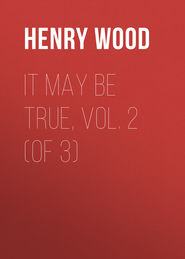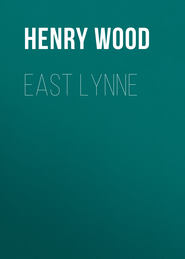По всем вопросам обращайтесь на: info@litportal.ru
(©) 2003-2024.
✖
Elster's Folly
Настройки чтения
Размер шрифта
Высота строк
Поля
At this moment a white-haired old serving-man entered the room with a note, claiming the Rector's attention. "The man's to take back the answer, sir, if you please."
"Wait then, Simon."
Old Simon stood aside, and the clerk, turning to Mrs. Ashton, continued his unfinished sentence.
"She wanted to persuade me she saw young Lord Hartledon pass at six o'clock this morning. A very likely tale that, ma'am."
"Perhaps she dreamt it, Jabez," said Mrs. Ashton, quietly.
Jabez chuckled; but what he would have answered was interrupted by the old servant.
"It's Mr. Elster that's come; not Lord Hartledon."
"Mr. Elster! How do you know, Simon?" asked Mrs. Ashton.
"The gardener mentioned it, ma'am, when he came in just now," was the servant's reply. "He said he saw Mr. Elster walk past this morning, as if he had just come by the luggage-train. I'm not sure but he spoke to him."
"The answer is 'No,' Simon," interposed the Rector, alluding to the note he had been reading. "But you can send word that I'll come in some time to-day."
"Charles, did you hear what Simon said—that Mr. Elster has come down?" asked Mrs. Ashton.
"Yes, I heard it," replied the doctor; and there was a hard dry tone in his voice, as if the news were not altogether palatable to him. "It must have been Percival Elster your wife saw, Jabez; not Lord Hartledon."
Jabez had been arriving at the same conclusion. "They used to be much alike in height and figure," he observed; "it was easy to mistake the one for the other. Then that's all this morning, sir?"
"There is nothing more, Jabez."
In a room whose large French window opened to flowerbeds on the side of the house, bending over a table on which sundry maps were spread, her face very close to them, sat at this moment a young lady. It was the same face you have just seen in the portrait—that of Dr. and Mrs. Ashton's only daughter. The wondrously sunny expression of countenance, blended with strange sweetness, was even more conspicuous than in the portrait. But what perhaps struck a beholder most, when looking at Miss Ashton for the first time, was a nameless grace and refinement that distinguished her whole appearance. She was of middle height, not more; slender; her head well set upon her shoulders. This was her own room; the schoolroom of her girlhood, the sitting-room she had been allowed to call her own since then. Books, work, music, a drawing-easel, and various other items, presenting a rather untidy collection, met the eye. This morning it was particularly untidy. The charts covered the table; one of them lay on the carpet; and a pot of mignonette had been overturned inside the open window scattering some of the mould. She was very busy; the open sleeves of her lilac-muslin dress were thrown back, and her delicate hands were putting the finishing touches in pencil to a plan she had been copying, from one of the maps. A few minutes more, and the pencil was thrown down in relief.
"I won't colour it this morning; it must be quite an hour and a half since I began; but the worst is done, and that's worth a king's ransom." In the escape from work, the innocent gaiety of her heart, she broke into a song, and began waltzing round the room. Barely had she passed the open window, her back turned to it, when a gentleman came up, looked in, stepped softly over the threshold, and imprisoned her by the waist.
"Be quiet, Arthur. Pick up that mignonette-pot you threw down, sir."
"My darling!" came in a low, heartfelt whisper. And Miss Ashton, with a faint cry, turned to see her engaged lover, Val Elster.
She stood before him, literally unable to speak in her great astonishment, the red roses going and coming in her delicate cheeks, the rich brown eyes, that might have been too brilliant but for their exceeding sweetness, raised questioningly to his. Mr. Elster folded her in his arms as if he would never release her again, and kissed the shrinking face repeatedly.
"Oh, Percival, Percival! Don't! Let me go."
He did so at last, and held her before him, her eyelids drooping now, to gaze at the face he loved so well—yes, loved fervently and well, in spite of his follies and sins. Her heart was beating wildly with its own rapture: for her the world had suddenly grown brighter.
"But when did you arrive?" she whispered, scarcely knowing how to utter the words in her excessive happiness.
He took her upon his arm and began to pace the room with her while he explained. There was an attempt at excuse for his prolonged absence—for Val Elster had returned from his duties in Vienna in May, and it was now August, and he had lingered through the intervening time in London, enjoying himself—but that was soon glossed over; and he told her how his brother was coming down on the morrow with a houseful of guests, and he, Val, had offered to go before them with the necessary instructions. He did not say why he had offered to do this; that his debts had become so pressing he was afraid to show himself longer in London. Such facts were not for the ear of that fair girl, who trusted him as the truest man she knew under heaven.
"What have you been doing, Anne?"
He pointed to the maps, and Miss Ashton laughed.
"Mrs. Graves was here yesterday; she is very clever, you know; and when something was being said about the course of ships out of England, I made some dreadful mistakes. She took me up sharply, and papa looked at me sharply—and the result is, I have to do a heap of maps. Please tell me if it's right, Percival?"
She held up her pencilled work of the morning. He was laughing.
"What mistakes did you make, Anne?"
"I am not sure but I said something about an Indiaman, leaving the London Docks, having to pass Scarborough," she returned demurely. "It was quite as bad."
"Do you remember, Anne, being punished for persisting, in spite of the slate on the wall and your nursery-governess, that the Mediterranean lay between Scotland and Ireland? Miss Jevons wanted to give you bread and water for three days. How's that prig Graves?" he added rather abruptly.
Anne Ashton laughed, blushing slightly. "He is just as you left him; very painstaking and efficient in the parish, and all that, but, oh, so stupid in some things! Is the map right?"
"Yes, it's right. I'll help you with the rest. If Dr. Ashton—"
"Why, Val! Is it you? I heard Lord Hartledon had come down."
Percival Elster turned. A lad of seventeen had come bounding in at the window. It was Dr. Ashton's eldest living son, Arthur. Anne was twenty-one. A son, who would have been nineteen now, had died; and there was another, John, two years younger than Arthur.
"How are you, Arthur, boy?" cried Val. "Edward hasn't come. Who told you he had?"
"Mother Gum. I have just met her."
"She told you wrong. He will be down to-morrow. Is that Dr. Ashton?"
Attracted perhaps by the voices, Dr. and Mrs. Ashton, who were then out on the lawn, came round to the window. Percival Elster grasped a hand of each, and after a minute or two's studied coldness, the doctor thawed. It was next to impossible to resist the genial manner, the winning attractions of the young man to his face. But Dr. Ashton could not approve of his line of conduct; and had sore doubts whether he had done right in allowing him to become the betrothed of his dearly-loved daughter.
CHAPTER IV.
THE COUNTESS-DOWAGER
The guests had arrived, and Hartledon was alive with bustle and lights. The first link in the chain, whose fetters were to bind more than one victim, had been forged. Link upon link; a heavy, despairing burden no hand could lift; a burden which would have to be borne for the most part in dread secrecy and silence.
Mirrable had exerted herself to good purpose, and Mirrable was capable of it when occasion needed. Help had been procured from Calne, and on the Friday evening several of the Hartledon servants arrived from the town-house. "None but a young man would have put us to such a rout," quoth Mirrable, in her privileged freedom; "my lord and lady would have sent a week's notice at least." But when Lord Hartledon arrived on the Saturday evening with his guests, Mirrable was ready for them.
She stood at the entrance to receive them, in her black-silk gown and lace cap, its broad white-satin strings falling on either side the bunch of black ringlets that shaded her thin face. Who, to look at her quick, sharp countenance, with its practical sense, her active frame, her ready speech, her general capability, would believe her to be sister to that silly, dreaming Mrs. Gum? But it was so. Lord Hartledon, kind, affable, unaffected as ever was his brother Percival, shook hands with her heartily in the eyes of his guests before he said a word of welcome to them; and one of those guests, a remarkably broad woman, with a red face, a wide snub nose, and a front of light flaxen hair, who had stepped into the house leaning on her host's arm—having, in fact, taken it unasked, and seemed to be assuming a great deal of authority—turned round to stare at Mirrable, and screwed her little light eyes together for a better view.
"Who is she, Hartledon?"
"Mrs. Mirrable," answered his lordship rather shortly. "I think you must have seen her before. She has been Hartledon's mistress since my mother died," he rather pointedly added, for he saw incipient defiance in the old lady's countenance.
"Oh, Hartledon's head servant; the housekeeper, I presume," cried she, as majestically as her harsh voice allowed her to speak. "Perhaps you'll tell her who I am, Hartledon; and that I have undertaken to preside here for a little while."
"I believe Mrs. Mirrable knows you, ma'am," spoke up Percival Elster, for Lord Hartledon had turned away, and was lost amongst his guests. "You have seen the Countess-Dowager of Kirton, Mirrable?"
The countess-dowager faced round upon the speaker sharply.
"Oh, it's you, Val Elster? Who asked you to interfere? I'll see the rooms, Mirrable, and the arrangements you have made. Maude, where are you? Come with me."
A tall, stately girl, with handsome features, raven hair and eyes, and a brilliant colour, extricated herself from the crowd. It was Lady Maude Kirton. Mirrable went first; the countess-dowager followed, talking volubly; and Maude brought up the rear. Other servants came forward to see to the rest of the guests.











